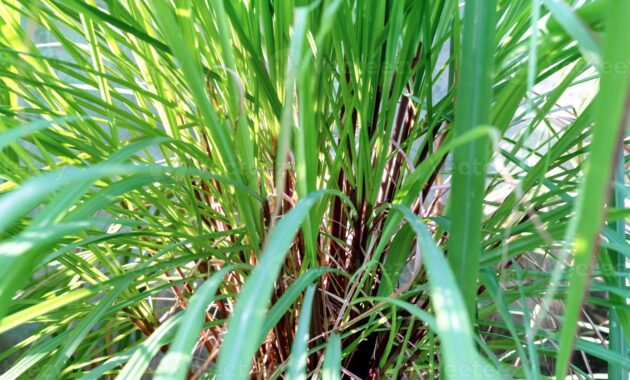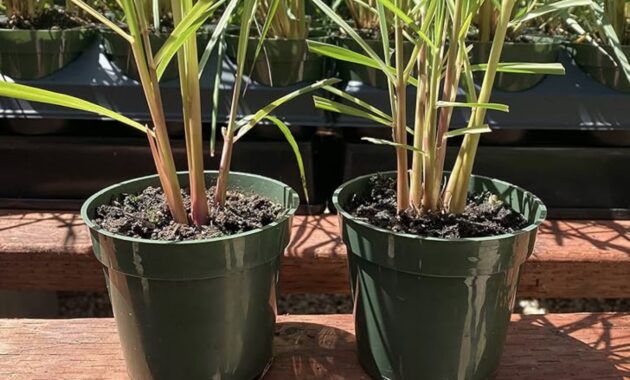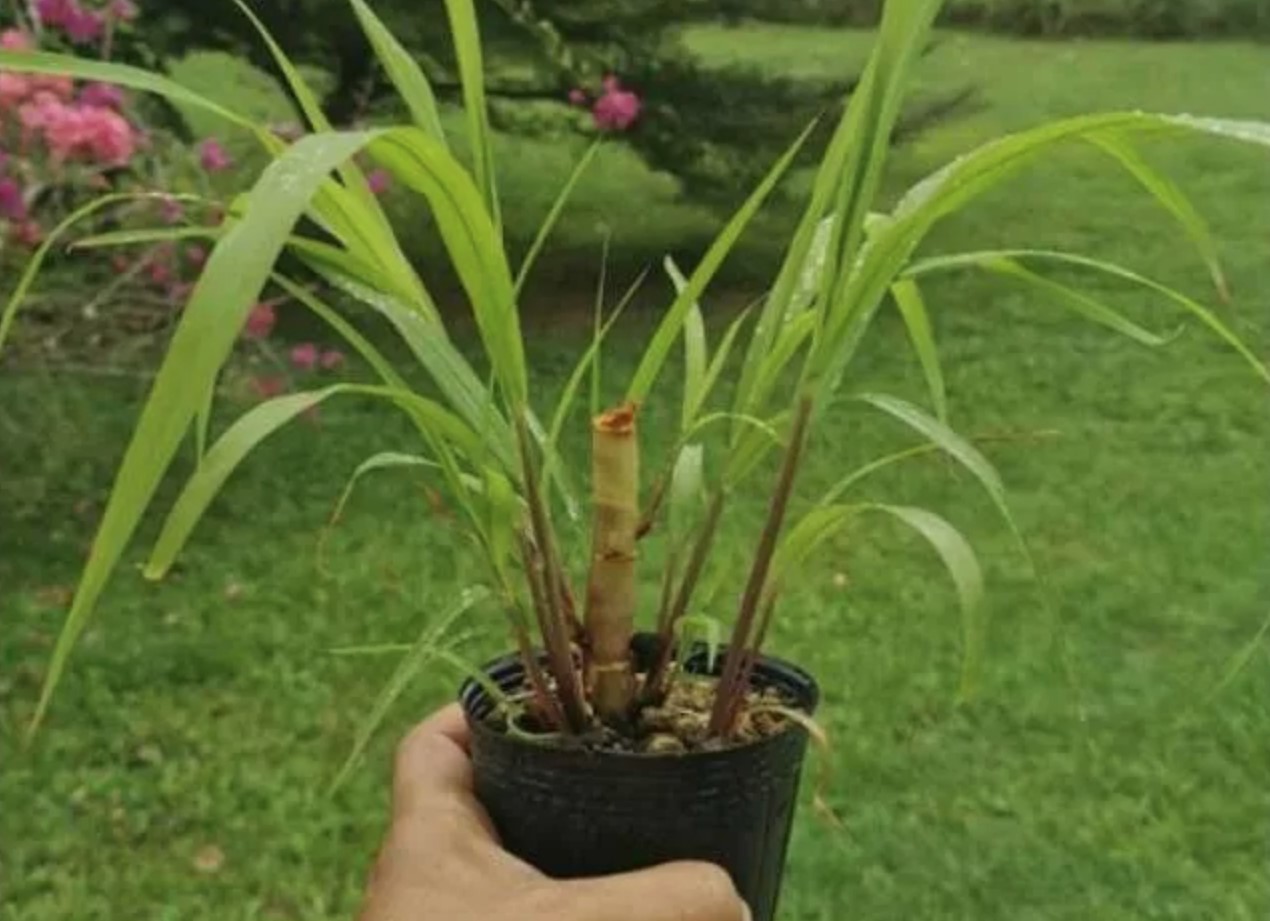
Cymbopogon nardus, commonly known as true citronella or Ceylon citronella, is a tropical grass from the Poaceae family. It’s renowned for its high concentration of citronella oil, which is widely used for its ability to repel insects, particularly mosquitoes. This plant is not only practical but also brings a vibrant, refreshing lemony fragrance to gardens and homes.
Overview of Cymbopogon nardus
| Feature | Description |
|---|---|
| Common Name | True citronella, Ceylon citronella |
| Scientific Name | Cymbopogon nardus |
| Family | Poaceae (Grass family) |
| Native Range | Sri Lanka, Southeast Asia |
| Height | 4 to 6 feet |
| Light Requirements | Full sun |
| Watering Needs | Moderate, prefers well-drained soil |
| Primary Use | Citronella oil, insect repellent, fragrance |
| Growth Habit | Clumping, grass-like |
| Fragrance | Strong citrusy, lemon-like scent |
| Toxicity | Non-toxic, but essential oil should be diluted before skin use |
Growing Cymbopogon nardus: Best Practices for Success
1. Full Sun is Essential
Like most grasses, Cymbopogon nardus thrives in full sun. If you’re planting it outdoors, ensure it’s in a location that gets at least 6-8 hours of direct sunlight daily. If you’re growing it indoors, place it by a bright, sunny window.
2. Soil and Watering Needs
The key to a happy citronella plant is well-draining soil. It prefers slightly moist but not soggy soil. Overwatering can lead to root rot, so make sure the soil dries out between watering sessions. Water when the top inch of soil feels dry to the touch.
3. Temperature and Humidity
Being a tropical plant, Cymbopogon nardus loves warm temperatures and high humidity. If you live in a cooler climate, it’s best to grow this plant in a pot so you can bring it indoors during colder months or grow it in a greenhouse. It won’t survive frosty conditions, so keep it warm.
4. Fertilization
You don’t need to fertilize Cymbopogon nardus frequently, but a slow-release, balanced fertilizer applied in the growing season (spring to summer) will boost its growth. Too much fertilizer can cause legginess, so apply sparingly.
5. Pruning for a Healthy Plant
Pruning is essential to keep your plant from becoming unruly. You can cut back dead leaves or trim the entire plant for more compact growth. Also, harvest leaves for personal use, whether it’s for making citronella oil or adding some fresh fragrance to your home.
The Many Uses of Cymbopogon nardus: More Than Just a Mosquito Repellent
While Cymbopogon nardus is best known for its mosquito-repelling abilities, it offers several other benefits.
1. Natural Insect Repellent
The essential oil extracted from Cymbopogon nardus contains citronellal, geraniol, and citronellol—the compounds responsible for its strong, lemony aroma. These compounds effectively repel mosquitoes and other insects, making citronella oil a popular ingredient in candles, sprays, and lotions designed for outdoor use. Just having this plant in your garden can help keep insects at bay.
2. Aromatherapy and Relaxation
The uplifting, fresh scent of citronella oil can help relieve stress and anxiety. If you’re feeling frazzled after a long day, diffusing a few drops of citronella oil will fill your space with a calming, citrusy fragrance. Many people also use it in baths or homemade body products.
3. Culinary Uses
Although not as widely used in cooking as lemongrass (Cymbopogon citratus), some cultures use Cymbopogon nardus in herbal teas or as a seasoning in certain dishes. It has a milder lemon flavor, making it a nice addition to tea blends, soups, and marinades.
4. Medicinal Properties
In traditional medicine, Cymbopogon nardus has been used for centuries to treat fevers, digestive issues, and inflammation. The essential oil is often used in massage therapy to ease muscle pain and joint inflammation.
Health Benefits of Cymbopogon nardus
Cymbopogon nardus doesn’t just smell nice—it has tangible health benefits, too. Here’s how this citronella powerhouse can improve your well-being.
1. Antimicrobial Properties
The essential oil from Cymbopogon nardus has antimicrobial and antifungal properties. It can be used in natural cleaning products to disinfect surfaces, kill germs, and keep your home smelling fresh. You can make a simple DIY cleaner by adding a few drops of citronella oil to water and vinegar.
2. Anti-inflammatory Effects
Citronella oil has been shown to have anti-inflammatory effects when applied topically (always diluted with a carrier oil like coconut or almond oil). It can help relieve muscle pain, joint stiffness, and even some forms of skin irritation like insect bites or rashes.
3. Mood-Boosting Aromatherapy
The fresh, citrusy scent of citronella oil has a natural mood-boosting effect. It can help reduce feelings of anxiety and depression when used in aromatherapy. Simply add a few drops to your diffuser, sit back, and let the relaxing scent take over.

Cymbopogon nardus vs. Cymbopogon winterianus: What’s the Difference?
Both Cymbopogon nardus and Cymbopogon winterianus are used for producing citronella oil, but there are a few differences between the two species. The primary difference is that Cymbopogon nardus is referred to as the “true citronella,” while Cymbopogon winterianus (Java citronella) has a higher yield of essential oil. For home gardeners, both are great choices, but if you’re looking for maximum oil production, Cymbopogon winterianus may be the better option.
| Characteristic | Cymbopogon nardus | Cymbopogon winterianus |
|---|---|---|
| Common Name | True citronella | Java citronella |
| Native Range | Sri Lanka, Southeast Asia | Java, Southeast Asia |
| Essential Oil Yield | Lower than winterianus | Higher yield |
| Primary Use | Insect repellent, fragrance | Insect repellent, oil production |
| Fragrance | Strong citrus scent | Similar citrus scent, slightly sharper |
Conclusion: Why Grow Cymbopogon nardus?
Growing Cymbopogon nardus is a rewarding experience. Whether you want to keep mosquitoes away, freshen up your home with its fragrant aroma, or even explore its medicinal properties, this plant has you covered. Plus, it’s relatively low-maintenance as long as you provide it with plenty of sunlight, warm temperatures, and well-drained soil.
For anyone looking to add a versatile, useful plant to their garden, Cymbopogon nardus is an excellent choice. It brings so many benefits without requiring much care—what more could you ask for? Give this citronella powerhouse a try, and enjoy a naturally fragrant, bug-free environment!



